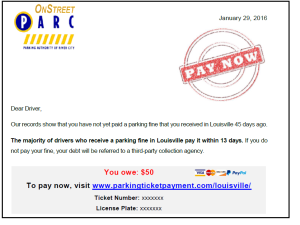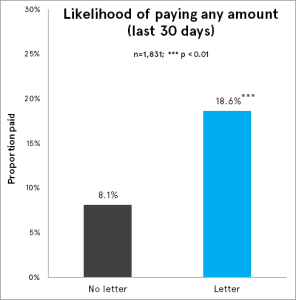Like death and taxes, parking tickets are a fact of life – especially in urban areas. While no driver likes seeing that slip of paper tucked under their windshield wiper, parking tickets serve important functions – like keeping busy roadways free of impediments and making parking fair to all drivers.
The problem is, many drivers just don’t pay them.
In a recent randomized controlled trial, with support from Bloomberg Philanthropies’ What Works Cities initiative, BIT partnered with the city of Louisville, Kentucky, to address this issue.
In the last half of 2015, Louisville had over $1.1 million in parking fees and fines that went unpaid, according to data provided by the city’s Parking Authority (PARC). These unpaid fines are not only an issue for the city, they’re an issue for drivers as well: if drivers ignore their ticket, they’ll be charged a late fee, and their debt will ultimately end up in the hands of a third-party collection agency.
In Louisville, drivers with unpaid tickets already receive reminder letters if they don’t pay: one after seven days, and another after 14 days. In an attempt to recover a piece of the $1.1 million pie, PARC wanted to send a third letter to drivers who still had unpaid tickets after 45 days. To measure how effective a new letter would be, BIT randomly allocated 1,831 different drivers to either a treatment or control group.
Drivers in the control and treatment group were still sent the first two letters (after seven and 14 days). The only difference is that drivers in the treatment group were sent an additional letter that BIT helped design. Among other things, this new letter informed the driver that their debt would be referred to a third-party collection agency if they still did not pay.
Another feature of the new letter was the use of social norms. The letter included the true statement that “The majority of drivers who receive a parking fine in Louisville pay it within 13 days.”
Additionally, based on previous BIT work in New South Wales, we added a “Pay Now” stamp to the front of the letter to make it clear what action we wanted the driver to take.
An example of the letter is shown below:
One month after the letter was mailed, we looked to see whether those in the treatment group were more likely to pay their fine than those in the control group.
The results were impressive.
The new letters increased payments by 10.5 percentage points, from a base rate of 8.1% – after controlling for the parking fine amount and vehicle state of registration.
Also, the new letter more than doubled incoming revenue in the study sample. On average, each letter sent generated $5.47 worth of additional revenue ($4.53 net revenue after accounting for the cost of printing and postage).
We’re pleased to report that the City of Louisville is adding this letter to their operations. We estimate that this third letter, after accounting for costs, could bring forward an additional $100,000 for the city each year.
There’s plenty more to be done, though. In Louisville, drivers who pay their fine within seven days of when the ticket is issued receive a $10 discount. Yet 40% of drivers who eventually pay their fine don’t take advantage of this. Developing new ways to encourage drivers to pay their parking tickets earlier is another line of work we’re keen to explore.



